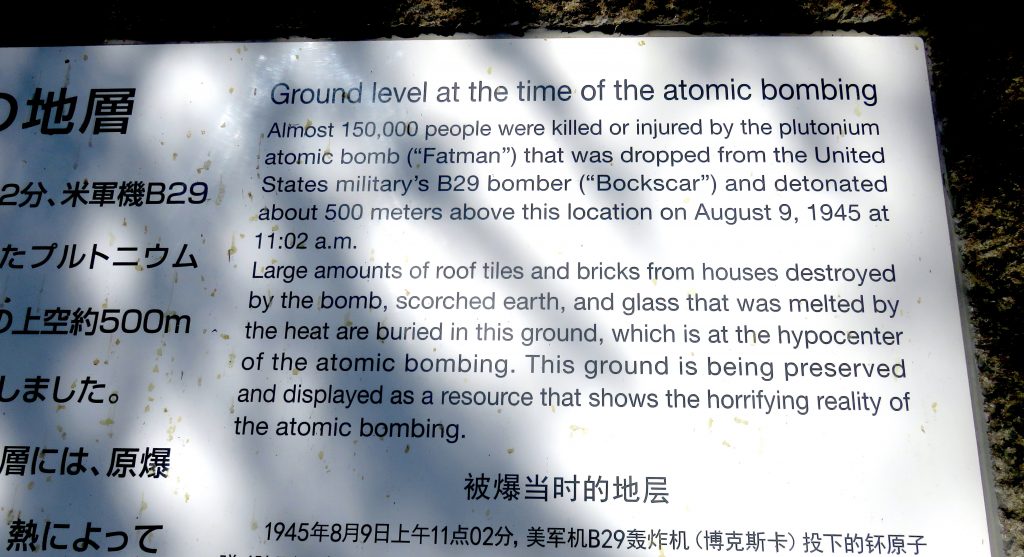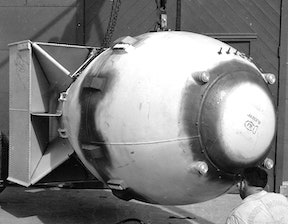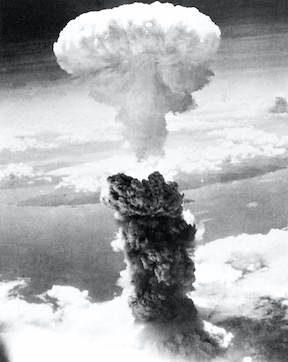Several years ago I visited Hiroshima. Very recently I was in Nagasaki. As is common knowledge, these were the Japanese cities on which the U.S. dropped atomic bombs, the only time in history nuclear weapons have been used in war.
Both cities have peace parks, peace memorials, and peace museums honoring the victims of these war crimes and making a noble attempt to get the world to completely abolish these horrifying weapons of mass extermination once and for all.
My reaction after spending several somber hours at each location was: ‘Everyone should be required to see this, learn the truth about the bombings, and come to fully understand the profound existential threat nuclear arms truly are.’
The problem is that the people who visit these sites are folks like Masumi and I who already want peace. And the people who really need to visit them never do, and even if they by chance were somehow to stumble on them would not take any of it in with an open mind, with love in their hearts, with a desire to learn and develop an appreciation of their fellow human beings. They worship war and view those of us who want peace as sentimental fools.
The museums offer a wealth of important insights, insights that are suppressed by our sociopathic “handlers” who know the truth but want to keep it from us normal sane folks, because we would then understand the pure evil that possesses them, their pathological agenda, and the self-destructive obsessions at the core of their desire for world conquest.
Here are three shocking facts both the Hiroshima and Nagasaki peace museums rigorously document, indisputable evidence that the dropping of the atomic bombs were war crimes.
1) The bombs purely targeted civilians. There were no legitimate military targets near the epicenters of the blasts. The Nagasaki plutonium weapon exploded directly above hospitals, elementary and high schools, churches, a college campus, and residential buildings.
2) The dropping of the bombs was “scientific” fact finding, to determine under real conditions how effective they would be, meaning exactly what the devastation would look like. Documents from the U.S. government confirm this.
3) The dropping of the bombs was not a military necessity, but a political statement. It put the world on notice — directed especially at the Soviet Union — who would wield the ultimate power in the post-WWII world.
As has horrifyingly become apparent, there would be nothing unique about this merciless and unnecessary slaughter of Japanese civilians. Over the coming decades, the U.S. would go on a genocidal rampage: more than 1.5 million innocent North Korean citizens in the Korean War; 2 million Vietnamese non-combatants in the Vietnam War; at least 176,000 killed over twenty years in Afghanistan, from of a war we started; nearly 500,000 Iraqi deaths the direct result of our invasion of that country. More deaths in Syria, Libya, now Ukraine, all directly attributable to U.S. military aggression and imperial hubris.
But Hiroshima and Nagasaki was when our hyper-savagery initially went into high gear.
This is why we should — and must — talk, and talk honestly, about these events that occurred in the frenzy of war almost 78 years ago.
But I fear we won’t. Instead, we’ll continue to rationalize and lie, sugar-coat the truth, immerse ourselves in fairy tales, glorify war, and tolerate the worst among us to lead us closer and closer to the abyss of human annihilation. There are war planners in the MIC who now are saying we can win a nuclear war. Someone must be putting LSD in the water coolers at these think tanks!
How can we end this madness? Where can we find the courage to confront the destroyers of dreams, the killers of innocents, the psychopaths who risk the lives of every human on earth?
Don’t we owe to ourselves and this amazing human experiment to do something?
War is bankrupting us morally, economically, socially, spiritually!
Nuclear war threatens all life on the planet!
We must end the insanity!
While you’re thinking about these last few remarks, here are a few photos of the Nagasaki Peace Park, and the memorial garden which sits right in front of the peace museum.






